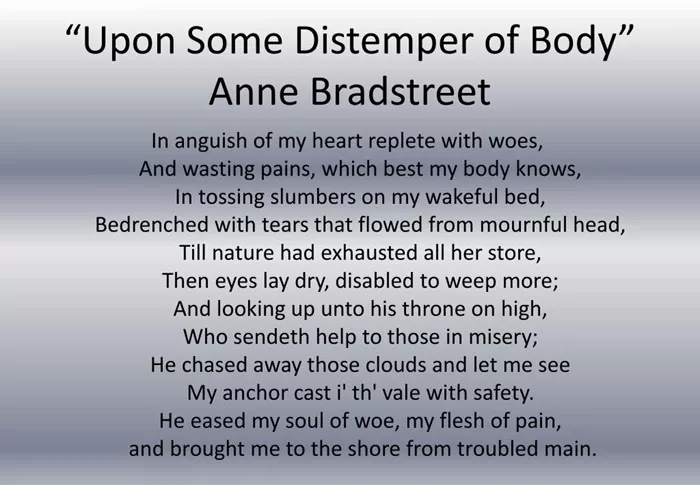Welcome to Poem of the Day – Upon Some Distemper Of Body by Anne Bradstreet.
Anne Bradstreet, one of the most prominent early American poets, is known for her heartfelt and introspective poetry. In her poem “Upon Some Distemper Of Body,” Bradstreet reflects on her physical suffering and explores themes of illness, mortality, and the divine. The poem is an honest account of how the poet grapples with the pain of her body and the spiritual lessons she seeks from it. Through simple yet profound language, Bradstreet conveys not only her personal experience but also universal truths about human vulnerability and faith.
Upon Some Distemper Of Body Poem
In anguish of my heart replete with woes,
And wasting pains, which best my body knows,
In tossing slumbers on my wakeful bed,
Bedrenched with tears that flowed from mournful head,
Till nature had exhausted all her store,
Then eyes lay dry, disabled to weep more;
And looking up unto his throne on high,
Who sendeth help to those in misery;
He chased away those clouds and let me see
My anchor cast i’ th’ vale with safety.
He eased my soul of woe, my flesh of pain,
and brought me to the shore from troubled main.
Upon Some Distemper Of Body Explanation
Context of the Poem
Anne Bradstreet was a Puritan woman living in the 17th century. During this time, life was often harsh, and people faced numerous hardships, including illness and death. Bradstreet, like many of her contemporaries, often wrote about her personal struggles, including the emotional and physical pain she endured. Her writing provides insight into the Puritan mindset, which placed a strong emphasis on faith, providence, and understanding suffering as a part of God’s will. “Upon Some Distemper of Body” was written during a time when Bradstreet was suffering from an illness, and it reflects her thoughts on physical affliction in light of her faith.
Summary of the Poem
In the poem, Anne Bradstreet addresses her illness, describing the torment and distress she experiences. She begins by expressing her frustration at being afflicted by disease, asking why her body is suffering and why such pain has befallen her. However, as the poem progresses, Bradstreet’s tone shifts from lamentation to reflection. She contemplates the meaning of her suffering and sees it as an opportunity for spiritual growth. She recognizes her bodily pain as a reminder of her human frailty and the temporary nature of life.
Bradstreet also meditates on the concept of divine will. Despite her suffering, she acknowledges that her affliction may be a form of divine discipline, aimed at refining her character and bringing her closer to God. In this sense, her physical discomfort becomes a tool for spiritual enlightenment. She ultimately surrenders to the will of God, trusting that any pain she experiences has a purpose and will ultimately lead to her spiritual betterment.
Analysis of Themes
Illness and Mortality: Bradstreet uses her physical ailment as a symbol of the broader human condition. Through her personal experience, she reflects on the fragility of life and the inevitability of death. Her illness is a reminder of her mortality and the transient nature of earthly existence. By confronting this reality, Bradstreet seeks to remind herself of the importance of focusing on spiritual matters and preparing for the afterlife.
Suffering and Faith: The poem illustrates how suffering can lead to spiritual growth. Bradstreet does not shy away from expressing her discomfort, but she reframes it as an opportunity for reflection and self-improvement. She seems to suggest that physical pain can lead to greater wisdom, humility, and trust in God’s will.
Divine Providence: In line with Puritan beliefs, Bradstreet comes to see her illness as a result of God’s will. She wonders whether her suffering is a form of punishment or a way for God to refine her soul. Ultimately, she accepts that everything, including her physical pain, is part of a larger divine plan.
Acceptance and Surrender: The poem closes with a note of acceptance. Bradstreet acknowledges that she may not fully understand the reasons for her suffering, but she trusts in God’s purpose. This surrender to God’s will is a key theme in Puritan thought, where submission to divine authority is seen as a path to spiritual salvation.
Tone and Style
The tone of “Upon Some Distemper of Body” is introspective and contemplative. Bradstreet moves from an initial state of frustration to one of acceptance, and this shift is evident in her writing. The language she uses is straightforward, but it is also imbued with emotional depth. Bradstreet’s skill lies in her ability to express complex spiritual concepts in simple, clear terms that are accessible to her readers.
Her style is also marked by the use of imagery. Although she does not use elaborate or elaborate metaphors, her description of physical pain and suffering is vivid and relatable. At the same time, her understanding of the spiritual dimensions of suffering adds depth to the poem.
Conclusion
“Upon Some Distemper of Body” by Anne Bradstreet is a powerful reflection on the intersection of physical suffering and spiritual growth. Through her personal experience with illness, Bradstreet explores themes of mortality, faith, and divine providence. The poem offers a comforting perspective on human suffering, suggesting that even in our pain, there may be a greater purpose. By surrendering to God’s will, Bradstreet finds peace, and her words continue to resonate with readers today. The poem serves as a reminder that suffering is an inevitable part of life, but it can also be an opportunity for spiritual enlightenment and personal growth.

